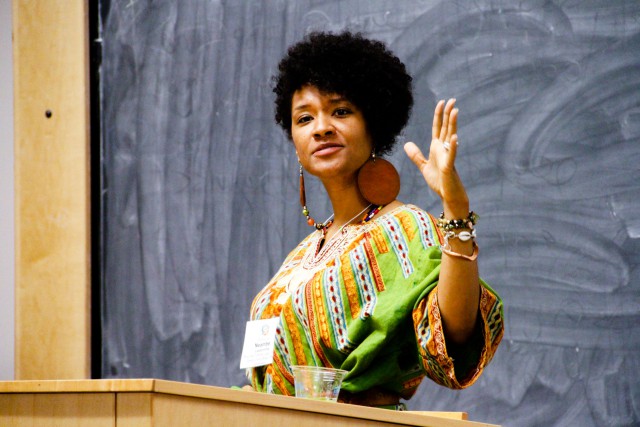
The environmental world is ripe with buzzwords, and it’s normal to doubt their significance. But if the pioneer of the local food movement, Gary Nabhan, says Bioneers put on the most innovative conference in the world, then the word “bioneer” and ideas behind it become much more powerful. The Front Range Bioneers Conference returns to the University of Colorado Boulder Nov. 8-10 for a satellite forum of the larger national conference in California that brings together professionals to speak about the environment, health and social justice.
“It’s really the most innovative forum in the world that combines social justice, food justice and environmental justice,” says Nabhan. “Because they paint that larger context, we are reminded it’s not enough to have an organic farm if your organic farm is pumping groundwater with fossil fuel or mistreating its laborers. Because they take the whole view, it’s probably the most important dialogue going on in North America.”
Nabhan is this year’s keynote speaker and will present “Growing Food in a Hotter, Drier Land,” a session that deals with water scarcity and heat stress on plants and how to manage soil and water politics to curb the unpredictable consequences of climate change.
“Water scarcity, whether you’re in Boulder, Sacramento, Arizona or Texas, is going to be the major problem facing production agriculture in the western half of the United States,” Nabhan says. “In the last few years, we’ve seen four-fifths of the reservoirs dry in New Mexico, with farmers only being allowed one irrigation rather than eight to 10 from the reservoirs.”
A bioneer works to mimic ecological principles to solve problems without negatively harming the environment or society, and the tenets of Bioneers can be applied to global or local issues.
The regional conference, now in its 11th year in Boulder, draws people from across the country to explore sessions, workshops and presentations on Boulder issues, solutions and tools, says Marianne Martin, associate director of the Environmental Center at CU-Boulder, the organization hosting the conference.
“I’ve been involved for all 11 years and I hear stories from community members about how it has affected them individually and completely shifted people’s perspective and how they function on a daily basis,” Martin says. “It has had huge resonance on an individual level, and there have been entire organizations that have been founded or strengthened out of the Bioneers.”
One organization strengthened by principles taught at the conference is Local Food Shift Group, formerly Transition Colorado. The group works throughout the Front Range to encourage restaurants and organizations to commit to sourcing at least 10 percent of their ingredients and supplies from local providers.
“The impact that I experienced when I attended Bioneers and put on programs was that this is information that most people don’t have the access to,” says Lynette Hanthorn, executive director of Local Food Shift Group and conference speaker. “It’s wonderful to be in the presence of some of the community leaders and hear the national presentations that really penetrate the thinking of people, opening them up to really understanding a larger context of how individuals, organizations, institutions and governments are functioning.”
Lauren Richardson, greenhouse manager at Growing
Gardens and conference speaker, says the Bioneers conference gives her
an opportunity to connect with people who support Growing Gardens, but
don’t understand everything they do.
“I
think that the audience at Bioneers are typically an audience that
respect and appreciate the work that we do, but just because somebody
knows who we are doesn’t necessarily know everything that goes into what
we do,” says Richardson. She adds that the
ideas behind Bioneers are a big part of Growing Gardens “by respecting
the land that we work and involving our community and the people who
live in and around — that land is an essential part of Bioneers. We’re
creating a cycle through people and food and land that makes them all
interconnected and interdependent.”
Richardson
will speak at the conference alongside Catherine Long, owner of Long’s
Iris Garden, and Taber Ward, executive director of Mountain
Flower Goat Dairy, at a panel titled “Opportunities and Obstacles in
Urban Agriculture” at 1:30 p.m. Saturday, Nov. 9. The session will
explore the challenges of urban agriculture and land availability and
the cost, water rights and methods for increasing community involvement.
“This
a great way to get ideas and inspiration and remember we’re living in
touch with time, and in time of great need,” says Martin of the entire
Front Range Bioneers conference. “I always find everyone who attends the Bioneer classes walks away with hope.”
Front Range Bioneers Conference: Turning
Vision Into Action takes place Nov. 8-10 at the Eaton Humanities
Building on the University of Colorado Campus. Single day tickets are
$20 with advanced registration, $25 without, and a three-day pass is $55
with advanced registration, $65 without. Visit www.colorado.edu/ecenter/bioneers/ for more details.














